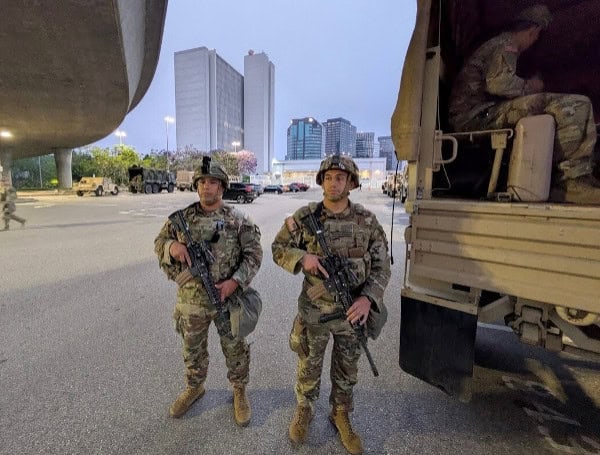
California Governor Gavin Newsom’s legal challenge against President Donald Trump’s deployment of the National Guard to maintain order in Los Angeles amidst past unrest appears to be on shaky ground, with legal experts predicting an uphill battle for the governor on appeal.
Despite a district court judge’s favorable ruling for Newsom on Thursday night, the Ninth Circuit Court of Appeals swiftly paused the decision, allowing the troops to remain in the city until at least Tuesday, when the next hearing is scheduled. This development casts doubt on the longevity of Judge Charles Breyer’s ruling, which asserted that Trump’s actions were “illegal—both exceeding the scope of his statutory authority and violating the Tenth Amendment to the United States Constitution.”
READ: Trump Admin Halts Immigration Raids At Farms, Restaurants, And Hotels
Legal scholars have largely expressed skepticism regarding Judge Breyer’s 36-page ruling. Josh Blackman, a law professor at South Texas College of Law Houston, told the Daily Caller News Foundation (DCNF) that the federal government typically receives deference in matters of security. “I think the court reached out to decide some novel and complex constitutional questions on an expedited basis,” Blackman stated, adding, “These are issues that the Supreme Court never weighed in on. I am confident this ruling will not stand.”
Former federal prosecutor Joseph Moreno echoed this sentiment, telling the DCNF that Judge Breyer’s reasoning was flawed on both procedural and substantive grounds. “With respect to process, Judge Breyer effectively conceded that Governor Newsom lacked a veto power over President Trump’s decision; however, he found that Trump’s notification to Newsom was insufficient despite the two having multiple phone conversations and the order being routed to the California Adjutant General, the commander of the National Guard,” Moreno explained. He dismissed this as “harmless error and certainly not the basis for declaring an entire Presidential deployment to be illegitimate.”
READ: Tucker Carlson Blasts Trump’s Iran Stance Amid Escalating Conflict, Calls To “Drop Israel”
Moreno further criticized Judge Breyer’s interpretation of the federal statute that permits the president to call the National Guard into federal service during a rebellion or “danger of invasion by a foreign nation.” He argued that Breyer “both decided what the standards meant and that Trump failed to achieve any of them.” Moreno concluded, “So we now have an unelected federal judge sitting in San Francisco asserting he can second guess the military decisions of the Commander in Chief, which is the President’s most sacred duty. In terms of both the law and the constitution expect Judge Breyer’s ridiculous decision to be overturned.”
Harvard law professor Jack Goldsmith, in a Substack conversation, called the “whole opinion slapdash,” asserting, “I was not persuaded by the judge’s second-guessing of the president. He was very selective in his definition of rebellion. He was not deferential at all on the president’s power to enforce the laws.” Goldsmith suggested the Supreme Court would “act more soberly,” though he did not predict their ultimate decision.
READ: Op-Ed: California Senator Padilla’s Calculated Disruption
Regardless of the outcome of this specific legal battle, it’s important to note that even if the National Guard deployment is halted, President Donald Trump had, and the federal government still has, other avenues to ensure public safety. U.S. Army Maj. Gen. Scott M. Sherman stated on Friday, according to The New York Times, that hundreds of Marines had already been sent to Los Angeles.
George Washington University law professor Jonathan Turley said on X, “It is important to also note that President Trump has ample authority to flood the zone with federal personnel even if the National Guard are neutralized pending appeal. In the end, the Administration will be able to maintain a significant force on the ground to protect federal personnel and facilities.”
READ: Florida Lawmakers Reach Budget Deal, Vote Expected Monday
The ongoing legal debate underscores the complex constitutional questions surrounding the division of authority between federal and state governments, particularly in times of civil unrest. The Ninth Circuit’s upcoming hearing is highly anticipated as it will provide further insight into the potential trajectory of this high-profile legal dispute.
Please make a small donation to the Tampa Free Press to help sustain independent journalism. Your contribution enables us to continue delivering high-quality, local, and national news coverage.
Connect with us: Follow the Tampa Free Press on Facebook and Twitter for breaking news and updates.
Sign up: Subscribe to our free newsletter for a curated selection of top stories delivered straight to your inbox.